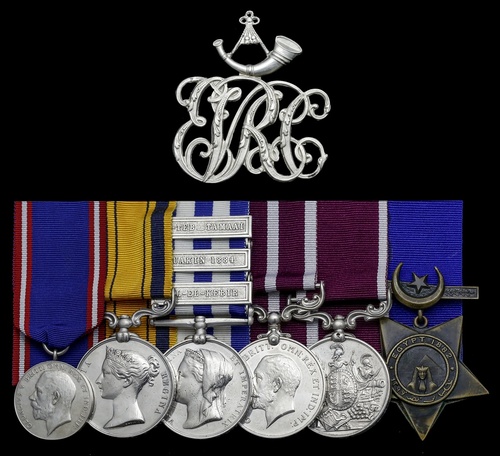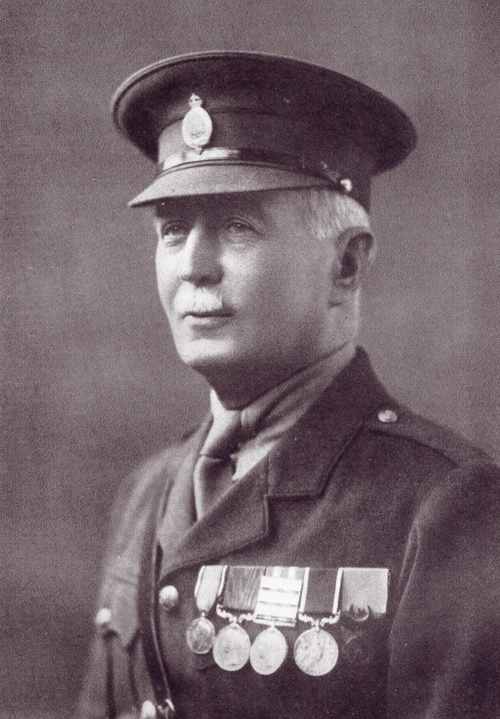Auction: 17002 - Orders, Decorations and Medals
Lot: 372
(x) A fine R.V.M., M.S.M. group of six awarded to Regimental Sergeant-Major H. W. 'Apples' Applin, King's Royal Rifle Corps
The Royal Victorian Medal, G.V.R., silver, this added for display purposes; South Africa 1877-79, no clasp (460 Pte. H. Applin, 3/60th Foot); Egypt and Sudan 1882-89, dated reverse, 3 clasps, Tel-el-Kebir, Suakin 1884, El-Teb-Tamaai (460 Pte. H. Applin, 3/K.R. Rif. C.); Army L.S. & G.C., V.R., 3rd issue (460 Col. Sgt. H. W. Applin, K.R. Rif.); Army Meritorious Service Medal, G.V.R., coinage bust (C. Sjt. H. W. Applin, K.R.R.C.); Khedive's Star 1882, the reverse depot impressed '460 3 K.R.R.' and privately engraved, 'H. W. A.', together with a 'V.R.C.' cap badge, the R.V.M. with traces of erasure to edge and the L.S. & G.C. with officially corrected surname and refixed suspension claw, edge bruising and contact marks, good fine or better (6)
Henry Warren Applin was born in India on 7 October 1861, the son of a soldier serving in the 25th Foot. Young Henry entered the Duke of York's School, Chelsea, in November 1873, from whence he joined the 60th Royal Rifles at Winchester as a boy recruit in October 1875.
Posted to the 3rd Battalion, he was appointed a Rifleman on attaining the age of 17 and was embarked for South Africa in February 1879. Owing to his age, he was employed at the regiment's depot in Natal and, in October 1879, he was appointed a Bandsman. He subsequently received the Medal without clasp, one of 38 such awards to the 3/60th Rifles.
Applin was next actively employed in the First Anglo-Boer War 1880-81 and was present in the actions at Ingogo River, Laing's Nek and Majuba Hill; he was among those sent atop the hill to bury the dead.
Having been embarked for Malta in early 1882, Applin and his fellow riflemen were soon ordered to Egypt where, in July, the Battalion moved up to Ramleh from Alexandria. He and his comrades were subsequently present at Tel-el-Kebir on 13 September 1882 (Medal & clasp; Khedive's Star). Applin, who was appointed Band Lance-Corporal in February 1884, next saw action in the Suakin operations, when he was present in the actions at El-Teb and Tamaai and added 2 clasps to his Medal.
During a subsequent tour of duty in Gibraltar, he was promoted to Band Corporal in August 1885, Sergeant Bugler in January 1888 and Colour-Sergeant in June 1891 and, having returned home, was awarded his L.S. & G.C. Medal in April 1894.
In October 1896, he transferred to the Oxfordshire Light Infantry as an instructor and thus began a remarkable association - extending some 33 years - with Eton College. First as Sergeant Instructor in the 4th (Eton College) Volunteer Battalion, Oxfordshire Light Infantry 1896-1902, secondly as Colour-Sergeant Instructor in the 2nd (Buckinghamshire) Eton College Rifle Volunteers 1902-08 and finally as R.S.M. in the Eton College Officers' Training Corps 1908-1929. Of this chapter in his life, his obituary notice in the King's Royal Rifle Corps Chronicle of 1943 stated:
'It was during these happy years that 'Apples', as he was called, made such a host of friends. The boys adored him. Among many thousands who he trained at Eton were the Duke of Gloucestershire, Prince Arthur of Connaught, King Leopold of Belgium and the King of Siam … His long row of medals was a rarity in those days, but 'Apples' will be chiefly remembered for his unfailing good humour and his red and cheerful face which always made him look so much younger than he was.'
He was awarded the R.V.M. in silver, which distinction he received from the King at Windsor Castle on 3 May 1918, and the M.S.M. in AO 142 of 1935.
Applin died at Littlehampton, Sussex, in June 1943; sold with an extensive file of copied research.
Subject to 5% tax on Hammer Price in addition to 20% VAT on Buyer’s Premium. For more information please view Terms and Conditions for Buyers.
Sold for
£2,000







